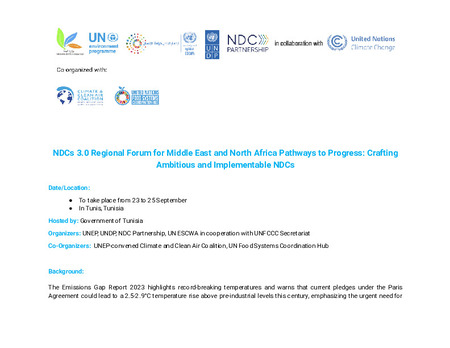NDCs 3.0 Regional Forum for Middle East and North Africa - Pathways to Progress: Crafting: Ambitious and Implementable NDCs

Date
2024-08Author
United Nations Environment Programme
Citation Tool
Bibliographic Managers
RT Generic T1 NDCs 3.0 Regional Forum for Middle East and North Africa - Pathways to Progress: Crafting: Ambitious and Implementable NDCs A1 United Nations Environment Programme YR 2024-08 LK https://wedocs.unep.org/20.500.11822/46063 PB AB TY - GEN T1 - NDCs 3.0 Regional Forum for Middle East and North Africa - Pathways to Progress: Crafting: Ambitious and Implementable NDCs AU - United Nations Environment Programme Y1 - 2024-08 UR - https://wedocs.unep.org/20.500.11822/46063 PB - AB - @misc{20.500.11822_46063 author = {United Nations Environment Programme}, title = {NDCs 3.0 Regional Forum for Middle East and North Africa - Pathways to Progress: Crafting: Ambitious and Implementable NDCs}, year = {2024-08}, abstract = {}, url = {https://wedocs.unep.org/20.500.11822/46063} } @misc{20.500.11822_46063 author = {United Nations Environment Programme}, title = {NDCs 3.0 Regional Forum for Middle East and North Africa - Pathways to Progress: Crafting: Ambitious and Implementable NDCs}, year = {2024-08}, abstract = {}, url = {https://wedocs.unep.org/20.500.11822/46063} } TY - GEN T1 - NDCs 3.0 Regional Forum for Middle East and North Africa - Pathways to Progress: Crafting: Ambitious and Implementable NDCs AU - United Nations Environment Programme UR - https://wedocs.unep.org/20.500.11822/46063 PB - AB -View/Open
Item Statistics
Display item statisticsMetadata
Show full item recordDescription
The Emissions Gap Report 2023 highlights record-breaking temperatures and warns that current pledges under the Paris
Agreement could lead to a 2.5-2.9°C temperature rise above pre-industrial levels this century, emphasizing the urgent need for
increased climate action. As per the 2023 NDC Synthesis Report, although emissions stabilize post-2030, they fail to decline
rapidly enough to meet scientific targets outlined by the IPCC in its sixth Assessment Report. The IPCC emphasizes that global
greenhouse gas emissions must decrease by 43% by 2030 and 60% by 2035 relative to 2019 levels to align with pathways
limiting global warming to 1.5°C. The rapid and targeted reduction of methane and other short-lived non-CO2 pollutant
emissions plays a critical role, complementing deep decarbonisation efforts. Only a dual track will enable us to curb the global
warming curve fast enough. Cuts in short-lived non-CO2 pollutants, due their high global warming potential and shorter lifetime
in the atmosphere, can reduce 0.5 degrees of warming by 2050.
Collections
Document Viewer
To read more, scroll down below.

